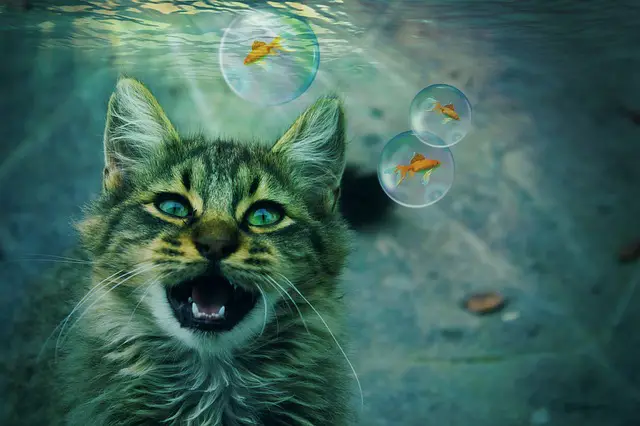Can cats eat salmon skin? – Good question – one that I have wondered about myself!
If you are like me, you often feed scraps from your plate to your pets – after all, that’s what pets are for aren’t they!
I do not eat salmon’s skin and I often give it to my dog and cat. Yes, salmon skin is safe for cats to eat and it even contains the same nutrients as salmon does.
So, if you are wondering – can cats eat salmon skin? – the answer is Yes. I will go into details in this guide:
Can Cats Eat Salmon Skin? What are its Health Benefits
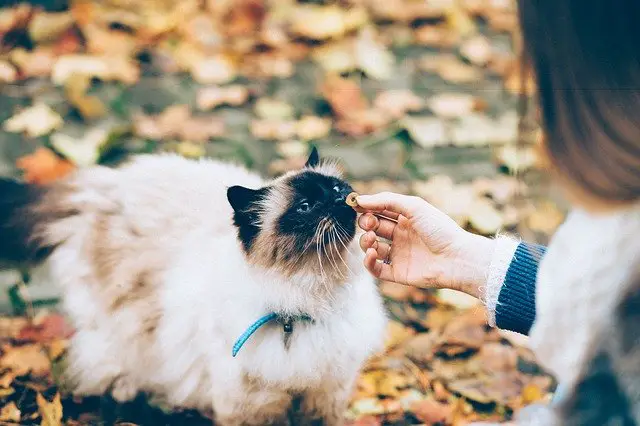
Yes, properly prepared salmon skin is safe for cats to eat.
So, if you have the habit of leaving behind salmon skin on your plate, you can feed it to your pets instead of throwing it in the bin.
The key is preparing the salmon properly. I will tell you exactly how to feed salmon to your cats later in this guide. In the meanwhile, here are the health benefits of salmon skin for your cat:
1. Provides omega 3 fatty acid
Salmon and fish skin both contain omega 3 fatty acid which can benefit your cat’s joints, heart, and vision.
These healthy fats are also critical for normal cell functioning and aid in the absorption of vitamins A, D, E, and K.
2. Provides healthy protein
Salmon skin contains a ton of protein and cats are carnivores that need plenty of protein on a daily basis.
Also, most cats are able to tolerate salmon fish well without having an allergic reaction to it. Therefore, if your cat has sensitive digestion and has food allergies to chicken or turkey, then it might be able to handle salmon quite well.
3. Promotes healthy skin and coat
Many pet food brands are adding salmon to their products since salmon can benefit your pets’ skin and coat by protecting its lipid barrier, preventing moisture loss, and reducing dryness and flaking.
4. Reduces allergies
Omega 3 fatty acids in salmon skin can also prevent allergies in cats and keep their immune system strong while making your pet resistant to common infections and diseases.
5. Reduces inflammation
Salmon can also reduce inflammation in your cat’s body and prevent joint aches and pains.
6. Promotes healthy cardiovascular function
Omega 3 fatty acids in salmon skin give your pet a healthier heart and could even reduce the risk of heart disease in pets.
Can Kittens Eat Salmon Skin?
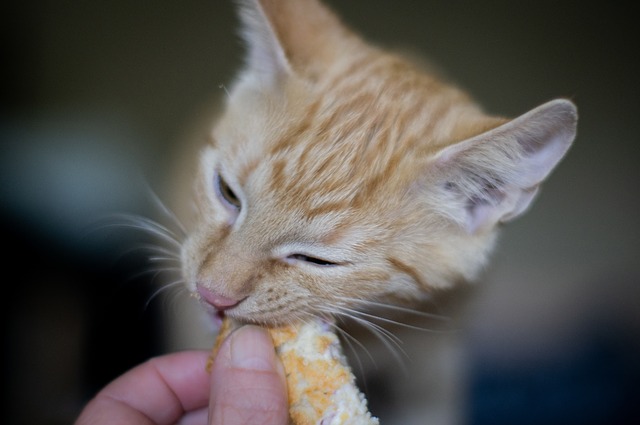
Never feed salmon skin to kittens younger than 6 weeks old. They need their mother’s milk until then.
Even after this age, your kitten needs a weaning diet consisting of gruel or special weaning food for at least 2 to 3 weeks.
Until then, avoid feeding salmon and salmon skin to your cat.
After about 10-12 weeks, you could feed a little bit of properly cooked salmon skin. Make sure you do not feed just salmon but also provide special kitten food to meet your pet’s nutritional needs.
Is Salmon Skin Toxic to Cats?
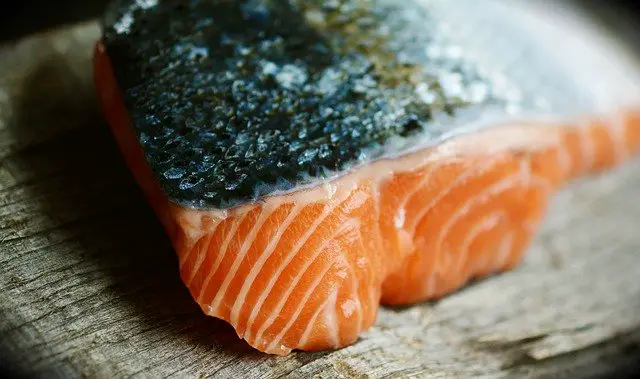
As pet parents, we all want to know what is and isn’t good for our beloved cats.
This is where things get complicated especially when it comes to answering the question: is salmon skin toxic to cats?
Salmon is definitely one of the healthiest super foods we can feed our cats and dogs, as long as they aren’t allergic to it.
However, there is an on-going debate about whether or not to feed farmed salmon to humans and pets.
1. What is the problem with farmed salmon?
Farmed salmon is salmon that is raised in ‘farms’ or sea cages under controlled conditions. Majority of the salmon we find in our markets is farmed.
Trouble started around 2003 when the EWG or the Environmental Working Group published a report stating that they had found farmed salmon to contain PCBs.
PCBs are polychlorinated biphenyls. These are carcinogens and their levels found in farm-raised salmon were quite ‘concerning’. PCBs can cause cancer in humans as well as in pets.
2. Other toxins
In addition to polychlorinated biphenyls, farmed salmon is also known to contain toxins like methyl-mercury and dioxins.
We have all heard about the dangers of mercury poisoning. Many fish are laden with this heavy metal which can cause toxicity in pets and humans when eaten in large amounts.
3. Questionable farming practices
Salmon farms are also accused of following unethical practices such as adding chemicals to their salmon feed which gives their salmon a desirable ‘pink’ color. This has raised many questions about such farming methods.
Bottom-line – is farmed salmon toxic to cats?
Yes, farmed salmon could be potentially toxic to cats. However, this is mostly true if you feed your cat a large quantity of salmon daily.
In moderation, your cat might not get those toxins in its system.
You can further reduce this risk by choosing wild-caught salmon (or Atlantic salmon) – just to be on the safe side.
However, even if you do opt for farm-raised salmon, then you can always go in for products from reputable salmon farms that do not add hormones, antibiotics, and other unwanted ingredients to their salmon feed.
This way, you can greatly reduce the said toxins and contaminants in your and your cat’s diet.
Can I Feed Cooked Salmon to My Cat?
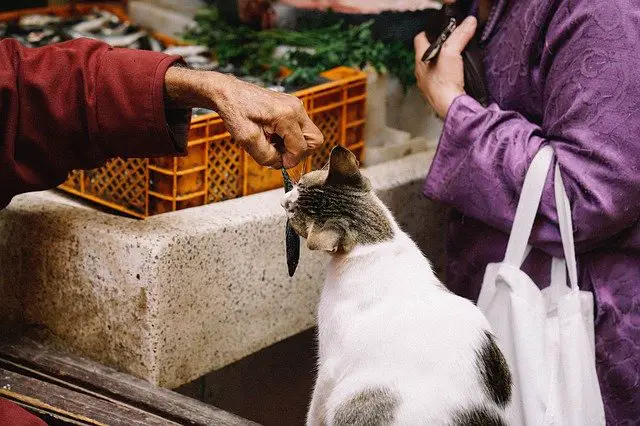
Yes, cooked salmon, like cooked shrimp, is okay to feed your cat, in moderation. However, the method of cooking is important.
Avoid feeding salmon made with sauces, butter, oil, spices, and even certain herbs and seasonings. Oil and butter can be hard to digest for most cats. Also avoid smoked salmon skin as it contains a lot of salt.
Plain baked, steamed, or grilled salmon and its skin are safest for cat – in moderation.
I will tell you exactly how to feed cat salmon and salmon skin in the subsequent section.
How to Prepare Salmon to Feed a Cat?
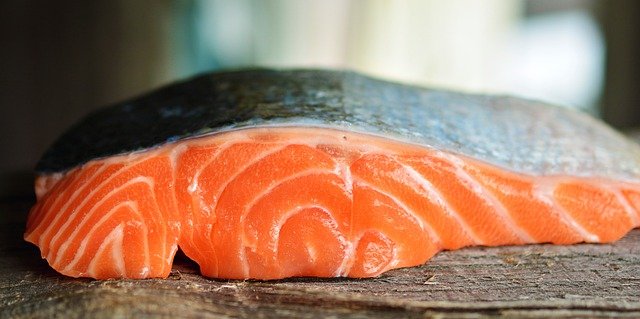
My cat loves salmon and its skin and she will readily devour it even raw!
However, you must never feed raw salmon fish to your cat since it can greatly increase your pet’s risk to salmonella and e.coli bacteria.
These bacteria can cause food poisoning symptoms in your pets which include severe vomiting, lethargy, diarrhea, lack of appetite, and so on. In extreme cases, salmonella poisoning can even kill weak pets.
Here’s how to prepare and feed salmon and salmon skin to cats:
A. Well-cooked fish (baked or grilled)
Always cook the salmon properly and never feed it raw or even semi-raw to cats. Do not use oil or fats to cook the salmon. Oil and butter are known to cause digestive upset in cats
The best way to feed salmon and its skin to your cat is by baking the fish properly. Bake at 350 F for 8-10 minutes or until the fish is tender.
If your salmon steaks are thicker, then you need to cook them even longer – 8 minutes per side. Make sure the fish flesh is white and no longer pink.
B. Poached
You can also feed poached salmon and its skin to cats. Poach the fish in water 3-4 minutes per side over medium heat. Adjust the poaching time according to the size of the salmon piece.
C. Without spices and herbs
Avoid adding any spice, salt, herbs, and condiments to your cat’s salmon.
Many seemingly innocuous herbs (including mint) and spices can be harmful to cats’ digestive system. Even excess salt can cause salt toxicity in cats.
Symptoms of salt toxicity are vomiting, diarrhea, and even seizures in pets.
D. Mix it with your pet’s regular foot
Mix the cooked (baked/grilled/poached) salmon and its skin with your cat’s kibble or canned food. You can also mix it with plain boiled rice and feed it to your feline friend.
How Much Salmon Skin Can My Cat Eat? Is Too Much Salmon Skin Bad for Cats?
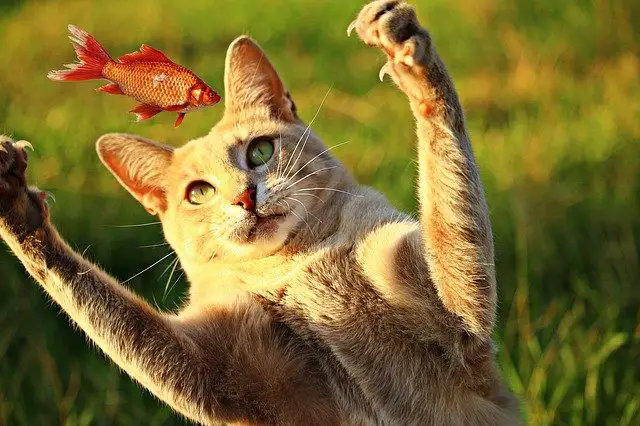
You should never make salmon or raw salmon skin the main part of your cat’s diet.
Yes, our cats are obligate carnivores and most cats love the taste and flavor of salmon. My cat comes running whenever I cook fish and I have to give it a few tidbits.
However, salmon alone cannot provide the balanced nutrition your cat needs for optimum well-being. They need other proteins, vitamins, and minerals which salmon alone cannot provide.
There’s nothing wrong in feeding salmon skin and salmon once in a while to your pet. However, many cats are known to get extremely addicted to fish and they often turn picky eaters and refuse other foods.
That is why, an occasional treat of salmon skin is fine. But make sure your cat also gets well-balanced canned food or dry commercial cat food that can provide it with taurine, vitamins, minerals, and proteins that your cat needs on a daily basis.
Do Cats Prefer Salmon or Tuna?
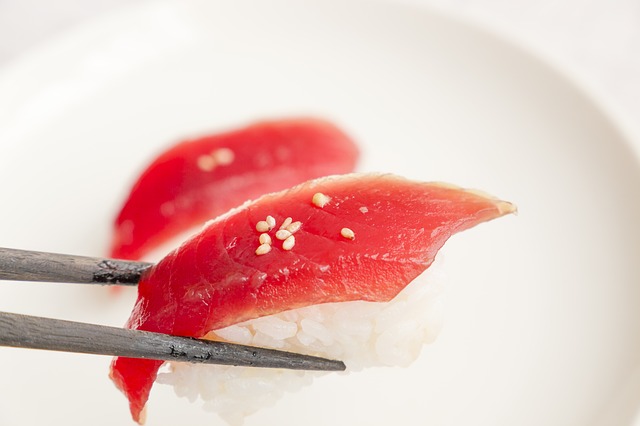
Most cats love both tuna and salmon. However, some cats are allergic to all kinds of fish. So watch out for signs of salmon allergy such as itching, hair loss, digestive upsets, etc.
Also, both tuna and salmon in excess, can cause urinary tract infections in cats.
Furthermore, you must never feed canned tuna fish or canned salmon to your cats. Canned fish in oil or salty brine is especially a strict NO for cats. These can cause serious upset stomach in your pet.
If you want you can choose canned fish in spring water to feed your cat.
Avoid making tuna and salmon a regular part of your cat’s diet as they can be extremely addictive for cats. Also, in excess, canned fish can cause steatitis in cats – a painful inflammatory condition.
Too much fish can even cause mercury poisoning in cats.
Can My Cat Eat Pink Salmon?
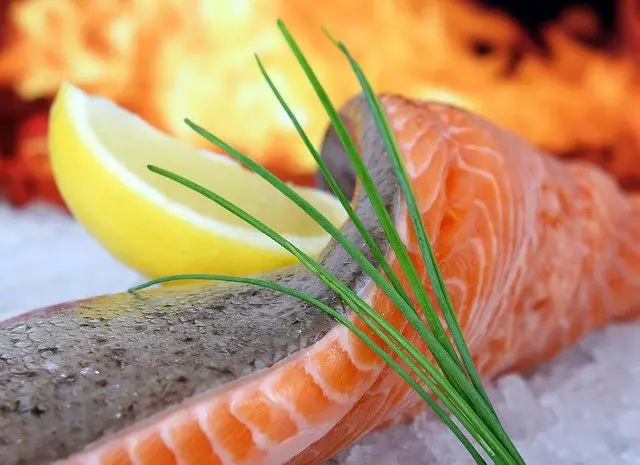
Pink salmon is the smallest Pacific salmon – also called humpback salmon.
Cats can safely eat pink salmon as long as you cook it properly.
In moderation, you can make pink salmon a part of your cat’s balanced diet. However, you must never use it as replacement for its regular canned cat food or kibble.
After all, pink salmon cannot provide your pet with all the nourishment it needs – although this is a healthy fresh fish and a great source of omega 3 fatty acid. It also contains B-vitamins and has a lovely taste which most cats love.
FAQs on Can Cats Eat Salmon Skin
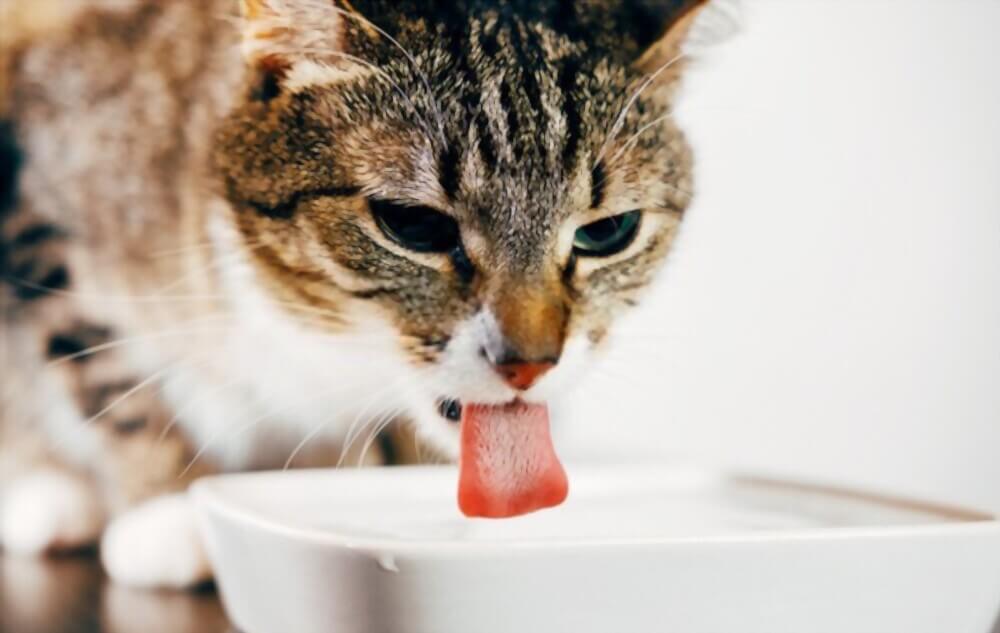
1. Can salmon kill cats?
Raw salmon can cause food poisoning (salmon poisoning) in cats which – if severe – can kill a small kitten or weak cat. However, this is very rare. Most cats can digest even raw salmon pretty well provided you know it is from a reliable source.
To reduce your cat’s risk of salmonella poisoning, please cook the fresh fish properly before feeding your pet.
2. What kind of fish can cats eat?
You can feed your cat canned tuna (in spring water), salmon, shrimp, sardines, and other oily fish.
Always watch out for fish bones.
3. Which is better for cats: chicken or fish?
Many finicky cats are known to find the taste of chicken very appealing. Chicken is also easy to digest and most cats can tolerate it well.
If your cat suddenly turns up its nose against chicken, then you can switch to fish.
Most picky cats like a change of taste every now and then. Fish is also a good choice for cats that are allergic to eggs, chicken, turkey, duck, and other poultry.
4. Why do cats like fish so much?
Fish gives off a salty and alluring aroma when you cook it. Cats loves this aroma and most felines love the salty, sea-like flavor of fish.
Often, other meats like chicken can be a bit bland especially for cats that are finicky or picky eaters. For them, fish is a much more appealing protein.
Conclusion
Can cats eat salmon skin?
Yes, cats are allowed to have salmon skin provided you cook it thoroughly. Salmon skin, like salmon, contains protein, omega 3 fatty acids, and other nourishment. Resultantly, most cats love its taste and flavor.
As always, practice moderation and when in doubt, check with your vet.
